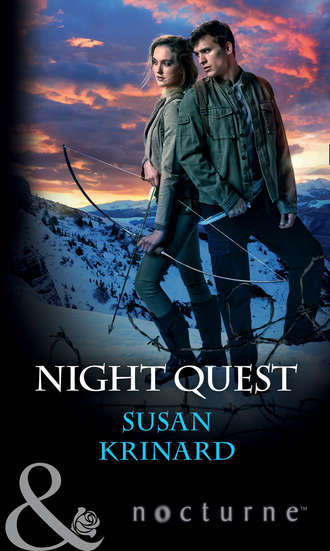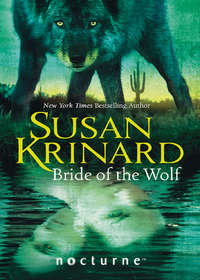
Полная версия
Night Quest
Two of the others began to shoot, but Garret had already moved out of their path. He shot one of the men in the hand, forcing him to drop his rifle. The youngest one yelled and charged at Garret wildly. His heedless rage gave Garret the chance to kick the weapon out of the boy’s grip before he could pull the trigger.
But another rifleman and the one he’d struck in the neck were almost on top of him. Someone flashed by him, a small figure who took the two men down so quickly that Garret couldn’t see how she’d done it. He didn’t take time to think it over. Shrugging out of his pack, he uncoiled the rope hanging from the metal frame and cut it into five lengths. By the time he turned back, all the militiamen were on the ground—alive, but weaponless and either unconscious or disabled.
He met Artemis’s gaze briefly and knelt beside Delacroix, who was moaning as he began to wake up. Garret rolled him over and tied his hands securely. The Opir woman helped him with the other men, her face and body shielded by an oversize hooded daycoat that was thick enough to protect her from the worst of the sun. She wore equally heavy gloves. Garret could only assume that she had kept the day clothes close by in case she was caught out of the woods after dawn.
He checked on each of the men when he was finished. Two of them were already struggling and cursing, while Delacroix and his second-in-command were bleary-eyed and disoriented. The youngest glared at Garret with undisguised hatred.
“Listen to me,” Garret said, crouching in front of him. “I’m going to set you free. You go back to your colony and tell them to come fetch their people.”
The boy pulled hard against the ropes around his wrists. “You gonna leave them out here for the rogues to eat?” he demanded.
Garret glanced at Artemis. “Are there any other Opiri in the area?” he asked.
“No.”
“You believe her?” the boy said, his face twisted in amazement.
“No Opiri are going to attack you in sunlight. Your people should be able to return with plenty of time to spare before dark.”
“Traitor!” the boy spat, tears running down his cheeks. “We’ll hunt you down.”
Garret moved behind the boy and cut through the ropes. “Take your pack,” he said, “and go.”
For a moment he thought the boy would stay and try to fight, but even he had enough sense to realize he didn’t have a chance. He grabbed the pack and ran off, his pace much too fast to maintain for more than a few minutes.
“You will pay for this,” Delacroix said, his words a little slurred. “We kill sucker-lovers around here.”
Garret ignored him. He gathered up the weapons and backed away until he was in the woods again. Artemis went with him. He noticed that she was carrying a bow in one hand and a quiver full of arrows in the other.
“Thank you,” Garret said roughly, trying to adjust the rifles’ straps so that he could carry them all at once to a place where the militiamen wouldn’t find them. “You can go.”
“You saved my life at the risk of your own,” Artemis said, her eyes reflecting crimson under the hood of her coat.
“I told you—”
“That you would not leave someone to be tortured,” she said. “But I still do not understand why you would turn against your own kind to help one of mine.”
Anger and grief clogged Garret’s throat and tore at his heart. “I knew an Opir who did the same for us.”
Her brows drew down and her lips parted as if she were about to ask how such a thing could be possible.
And then she collapsed.
* * *
Artemis woke to pain. Tiny filaments of agony circled her limbs and waist, her chest and neck. And her hands...
“Easy,” the human said as she tried to sit up. He eased her back down to the bed of fallen leaves on which she’d been lying.
Instinctively she resisted, irrational panic flooding her body. But he refused to let her up, and she realized that he was strong enough to impose his will.
Human or not, he was dangerous. She had seen him fight. He moved almost as fast as an Opir.
“You’re already healing,” he said, his brows knitting in a frown, “but if you push yourself, you’ll slow it down. We don’t want to stay here any longer than we have to.”
She disregarded the “we” and compelled herself to relax. “Where are the men?” she asked, casting about for their rank scents.
“It’s only been a few hours.” He glanced over his shoulder, and for the first time Artemis saw that they were far into the forest under a thick canopy of cottonwoods, protected on two sides by boulders that stood beside a small creek. She realized that she was wearing unfamiliar clothes that were much too large for her, carrying the oddly pleasant smell of the human who had saved her. Her daycoat and gloves lay neatly folded within reach; her knives, bow and quiver were farther away. It would take some effort to get them.
She might have just enough strength to surprise the human, grab her things and run.
“You don’t have to be afraid of me,” the man said, his eyes tracking her gaze.
“I am not afraid of you...human.”
“My name is Garret Fox,” he said, seemingly indifferent to her mockery.
“There is no need for you to stay,” she said. “It would be best if you did not.”
“Why? Are you planning on attacking me when my back is turned?”
The question seemed hostile, but his face was impassive. Too impassive to be credible. “If you believed that,” she said, “you would never have brought me here.”
“That’s right,” he said, dropping back into a crouch. “Saving my life just to kill me wouldn’t make much sense.”
She began to formulate an answer, but all at once she found herself lost in the extraordinary green of his eyes, like the moss clinging to the sides of the boulders. His dark red hair brushed the back of his collar, as if he hadn’t cut it in some time, and there was a shadow of darker hair on his jaw and upper lip. His features were strong but not coarse, his mouth mobile but decisive.
By human standards he was very attractive. And Opiri appreciated human beauty well enough to seek out serfs that bore the same qualities this man exemplified, such as his lean, fit body, broad shoulders and easy grace.
Artemis had never owned such a serf. She had never owned a serf at all, though she had been strong enough to stake out her own Household in Oceanus, if that had been her intent.
Now, in a haze of pain and caught in the snare of this human’s gaze, she wondered what it would have been like to own a man like this. What it might have been like if he were her Favorite, and they—
The man jerked away, and she realized that she had been touching his hand with her raw fingertips. His reaction had been so violent that she expected to see distaste on his face, but there was only confusion, as if he had been taken unaware by more than just the touch itself.
Artemis, too, was bewildered. Her fingertips tingled, and a series of small shocks ran through her arms and deep into the core of her body. Physical sensations she hadn’t experienced in many, many years.
And through that touch she felt something else. Something that she thought she’d been rid of for a very long time. An emotional aura flared briefly around Garret Fox, as red as his hair, fed by all the anger and passion his expression concealed.
The aura vanished quickly, but her shock lingered. The ability she had worked so hard to erase—the ability to sense and feel the emotions of others—had returned with a vengeance, and a human had reawakened it.
But how could that be possible, when her brief dealings with her own kind since her exile had had no effect at all?
Fight it, she told herself. If it takes hold again...
“Lie still,” Garret said, as if nothing had happened. “And keep that hand covered.”
She lifted her chin, hoping that he hadn’t noticed her bewilderment. “I am not accustomed to taking orders from your kind.”
“Call it a suggestion, then.” He cocked his head. “Why did you come back for me?”
“Do I not owe you my life?”
“Most of your kind wouldn’t feel bound by a debt to a human.”
“You said another Opir had helped you.”
Artemis could hear the steady rhythm of his heartbeat break and then resume at a slightly faster pace. “She was a remarkable person,” he said.
She. “What was her name?” Artemis said, trying and failing to control her curiosity.
“Roxana.” He shifted his weight and looked away. “Which Citadel did you come from?”
“Why does it matter?” she asked. “Do you plan to interrogate me now, where you will not be interrupted by my untimely death?”
“You are an exile, aren’t you?”
She wondered why he had chosen that word when he might as easily have called her a “rogue bloodsucker.” It was how he had spoken of her to the other humans. And how most humans thought of Freebloods, or Opiri in general.
Opiri. Nightsiders. Vampires.
“What else would I be?” she asked.
Her supposedly rhetorical question provoked a raised eyebrow and a keen look. She knew what was going through his mind: the same thing that was going through hers, but in reverse.
Both sides in the ongoing conflict between humans and Opiri had scouts and spies in the vast, supposedly uninhabited areas between human and Opir settlements, usually known as “Zones.” Most of the human colonies’ scouts and agents were mixed-breed Opiri, called dhampires. But a few pure-blood humans were skilled enough to survive in the Zones, even against Nightsider opponents.
Garret could easily be one such human. But he was too far from the nearest human Enclave to be one of their scouts, and she would bet her life—again—that he didn’t work for any of the militias.
“I am not an operative for any Citadel,” she said, answering his unfinished question.
“I believe you,” he said. “You were alone when those men found you?”
“I told you I was.”
“You also said you knew nothing about a human boy in this area.”
“I do not.” She hesitated. “This boy is your son?”
“Timon,” he said.
“I am sorry,” she said, realizing that she truly meant it. “I would help you if I could.”
He met her gaze. “You can.”
Alarmed by thoughts of what he might ask of her, she forgot her pain. “I am leaving,” she said, propping herself up on her elbows. “Do not try to stop me.”
“You aren’t going anywhere,” he said, getting to his feet.
“I may be injured,” she said, “but you appear to be unarmed except for a hunting knife, and even now I am stronger than any human.”
“I wouldn’t bet on it. Sit down, before you—”
Artemis climbed to her knees. Agony like a spear of sunlight drilled into her skull. Her mouth was dry, though she suspected that Garret must have given her water. She swayed, and all at once he was beside her, supporting her, holding her. He was warm and solid, and she could hear the steady beat of his pulse, the throbbing of his blood in his veins. The shock she had experienced earlier returned with his touch, a raw electric current that attacked her mind and body as if she had literally been struck by lightning.
“I said you weren’t going anywhere,” he said, gripping her more tightly when she tried to jerk away. He eased her down to the ground. “You’ll need blood or you won’t fully recover.”
His matter-of-fact statement gave her a very different kind of shock. Humans didn’t despise Opiri only because of their attempt to conquer the world but also because the very idea of feeding on blood was an abomination to their kind.
He did not offer you his blood, she thought wryly. But where else did he think she would get it, in her condition?
“Wherever you lived,” she said, “it must be very unlike the human compounds in this area.”
He pulled his pack close so that he could reach inside, and she caught a glimpse of a rifle stock, a kind she didn’t recognize. It wasn’t one of the weapons he’d gathered from the militiamen, then hidden. Apparently he wasn’t unarmed, after all.
“I assume the local militias kill every Nightsider they find,” he said.
“Yes,” she said. “They consider it their divine purpose to hunt down as many Opiri as possible. Do you find that strange?”
“The militia compounds see packs of vicious predators, and the rogues only a source of food. An eye for an eye.”
Now she heard in his voice what she’d sensed in his mind and seen in his aura: simmering anger fed by a deep fear that was not for himself.
Don’t think about his feelings, she reminded herself. Don’t let them get inside you again.
But she knew it wasn’t that simple. Her shields had fallen, and she had to build them back up again. As quickly as possible.
“What was it that your famous peacemaker once said?” she asked, forcing herself to remain calm. “‘An eye for an eye makes the whole world blind.’”
His laugh reflected his obvious surprise at her knowledge of human philosophers. “Very clever,” he said. “Most Opiri don’t have much interest in human wisdom. Are you one of those rare Nightsiders who see humans as more than barbarians, killers like the militiamen or potential serfs?”
“How else should I regard them?”
“Forgive me for my foolish question. Tell me—why don’t you live with other exiles?”
“It is not in the nature of Freebloods to live in packs,” she said.
He searched through his pack, and the scent of his skin—his blood—drifted toward her. “Not in the Citadels,” he said.
“And how do you know so much about our lives inside the Citadels?”
“Inside the Citadels or out,” he said, “Freebloods spend most of their time struggling constantly for dominance, so they can build Households of their own. That’s the entire basis for their existence.”
“It is not the basis for my existence,” she said.
“Because you don’t want to fight?” He withdrew a wrapped object from his pack. “Somehow, I don’t think you live apart because you’re afraid of being killed by your own kind.”
“I am not.”
“Then there’s something else about your fellow Freebloods that you don’t like. Do you hunt humans?”
The direct question startled her. “No,” she said, without thinking.
“That would explain it, then.” He opened the package to reveal several strips of dried meat, and Artemis’s stomach clenched with hunger. “I knew you were different when I first met you.”
“How would you know that?”
“Instinct.”
The same kind of instinct, she wondered, that had made her trust him so quickly? “And if you had determined that I was like every other Freeblood,” she asked, “would you have let me die?”
His very green eyes met hers. “But you aren’t,” he said. “I’ve met Opiri who didn’t believe in living on human blood on principle, and others who just didn’t believe in taking it by force. Which type are you?”
He spoke, Artemis thought, as if he had engaged in long, philosophical discussions with other Opiri, and that idea was flatly ridiculous. Wasn’t it?
“Many Freeblood exiles do not know how to live without human blood,” she said. “But most do not kill.”
Garret offered her a piece of jerky. “Too bad the ones who don’t kill can’t—or won’t—stop the ones who do.”
She pushed the offered food away. “Are you so certain they have not tried?”
“Have you?” he said, searching her eyes.
“I want what is best for my—” She broke off and took a deep breath. She had no reason to tell him what she had attempted and failed to achieve in Oceanus. He would never believe it was possible.
“You hate us, just like the militiamen do,” she said, covering her confusion with anger.
“Us is a very big word,” he said. “I don’t hate you.”
He was right, she realized. She couldn’t sense any personal hostility from him. To the contrary, he was intrigued by her, genuinely interested in knowing more about her life. She was afraid to look any further.
“I am still a Freeblood,” she said.
“But you’re no rogue,” he said, setting the knife down on a flat rock beside him.
She was almost tempted to let him go on thinking that she was superior to her own people. Different, as he claimed. She found that she wanted his good opinion.
But if she let herself believe that she was better than the rest, she would betray her own principles. Freebloods only needed to be shown, guided, by one who had seen a little way beyond the bars of the prison they so blindly accepted as the limit of their lives.
Guided not by emotion, but by rationality. She didn’t need her unwanted empathic ability to tell her that Garret was controlling feelings that might have paralyzed him if he set them free. In that, they were frighteningly alike.
“Where do you come from?” she asked. “From all you have said, it cannot be anything like the local compounds.”
“I live alone.”
“Without the protection of your own kind?” she asked. “Is that how you lost your son?”
Her cruel question had been meant to provoke an unguarded response—any response that would help her understand him—but all it did was open her mind to the ache of his sadness.
“It is my fault,” Garret said quietly.
The red aura flared around him again, and Artemis covered her face. It made no difference. She wasn’t seeing it with her eyes but with her heart. And now all she could feel was his pain, his sorrow, his terrible sense of loss.
She had known loss, too. But nothing like this. Not since she had been human herself.
“I am sorry,” she said, dropping her hands from her face. “Have I convinced you that I know nothing of this abduction?”
Staring at the dried strip of meat he still held in one hand, he gave a ragged sigh. “Yes,” he said.
His simple answer almost made her doubt his honesty. But the “talent” she’d tried to bury insisted otherwise.
If she was wrong...
A fresh stab of hunger caught her unaware, and she sank back to the ground with a gasp. Garret set down his scanty meal and leaned over her.
“You’ve spent too much time talking and not enough resting,” he said.
“And whose fault is that?” she whispered.
“I should have been more careful.”
She did her best not to notice the concern in his voice, his worried frown, the compassion he should not feel for one like her. Whoever and whatever he was, son or no son, she had to get away from him. The temptation to feed was terrifyingly strong in the wake of her injuries. If she should hurt him...
“You should continue your search,” she said, turning her face away, “and I must return to my shelter to collect my things and move on before the other humans find me.”
He ran his hand up and down his left sleeve. “Your physical state is obviously deteriorating. How far do you expect to get this time?”
“Far enough.”
“And then?”
Shivering with animal desires she could barely contain, Artemis moved to gather her things. “I am going. Do not follow me.”
“It won’t work.” His footsteps were almost silent as he moved behind her. “In a few minutes you’re going to collapse.”
“Then what do you suggest?” she asked, spinning to face him. “I see no other—”
“I obviously didn’t make myself clear,” he said. He pushed up his left sleeve. “I’m offering an alternative.”
Chapter 3
His meaning was terrifyingly clear, and suddenly Artemis was furious—at her own helplessness; at his inexplicable generosity, in spite of his valid reasons for despising her kind; at a world that had created such a bizarre set of impossible circumstances. Her mind and emotions and physical senses reacted all at once, making her excruciatingly aware of the body she had so admired.
Even thinking of taking his blood aroused not just her hunger for nourishment but for other things, as well. Her imagination began to spin scenarios that could never be. Her empathic talent burned more brightly—extending fingers of amethyst light, her light, toward Garret—and he began to breathe more heavily.
Vivid images sprang into her mind: lying beside Garret, naked in his arms as she sank her teeth into his neck; moaning in pleasure as the blood flowed over her tongue and he guided her down on top of him; urgency building as her hunger exploded into an unbearable need to feel him inside her, giving as she took, taking as she gave...
She came back to herself, her body hot and throbbing, to find him looking at her with that steady gaze, his eyes so clear that she could see every shadow passing beneath the surface. No pain now, no anger, no sorrow. Only need. And desire.
Desire for a Freeblood. For her. She looked from Garret’s hungry eyes down to his broad chest and lean waist, and then below, where the evidence of his response was so readily apparent.
And she was responsible. She had to put an end to it.
“How can you do this?” she asked. “How can you bear to let an Opir take your blood? Is it because of this Roxana?”
“I’ve done it before,” he said, his hunger still burning in her mind. “I have no reason to fear it.”
She wondered again where he’d come from. He hadn’t always been alone, not with such a casual attitude about donation. But if he had ever lived among Opiri...
“If I take your blood,” she said, “what do you expect in return?”
“Your help in finding my son.”
His blunt response took her aback. She felt the completely unexpected and irrational disappointment of realizing that he was being generous only because he wanted something from her. Something he had probably wanted from the very beginning.
If she gave in now, she would be throwing away the very principles she had worked so hard to establish since her exile.
“I cannot accept,” she said. “I must go.”
Garret’s expression changed again, as if he were waking from a deep sleep and had forgotten where he was. His aura folded in on itself and vanished. He rolled down his sleeve, returned to his pack and began to shift things inside it, clearly pretending to keep himself busy so that he wouldn’t have to deal with her. She watched him, her muscles frozen, knowing she would never see him again.
“I will lay a false trail,” she said, pulling on her daycoat with clumsy hands. “If the humans do find our tracks, they will follow mine. I’m sure they would far rather kill me than you, traitor though they may name you.” She stumbled a little as she took up her bow. “As your own people say, good luck.”
An instant later she was running...throwing all her energy into every step, hoping that the initial burst of speed would carry her beyond his reach before she lost her breath. She knew it was time to abandon the area completely, and not only because of Garret. She had to get away from the possibility of any human or Opir contact, and lose herself in a place so remote that not even the most desperate Freeblood exiles would claim it.
True to her word, she laid a false trail, though it took a good deal more of her energy than she could afford. When she reached her temporary shelter, a small cave in the side of a hill, she gathered up her few possessions and left as quickly as she could, dizzy but still able to maintain a regular pace.
Every step carried her farther and farther away from the human who had inexplicably saved her life, then turned it upside down. Her heart seemed to drag several feet behind her.
By the time she left the woods a few hours later and reached the narrow path that paralleled the old northbound Interstate 5, a cold, driving rain had begun to fall. Normally it would not have bothered her; Opiri had lower body temperatures than humans, but their efficient metabolisms and greater strength enabled them to bear adverse conditions for longer periods.
But her energy was draining away a little more with every hour that passed. Hunger gnawed at her constantly. The weather didn’t make her attempt to find game any easier, and she soon discovered that something had frightened away most of the local wildlife...a situation that might suggest an Opir pack in the area. She needed to avoid such packs at all costs.









